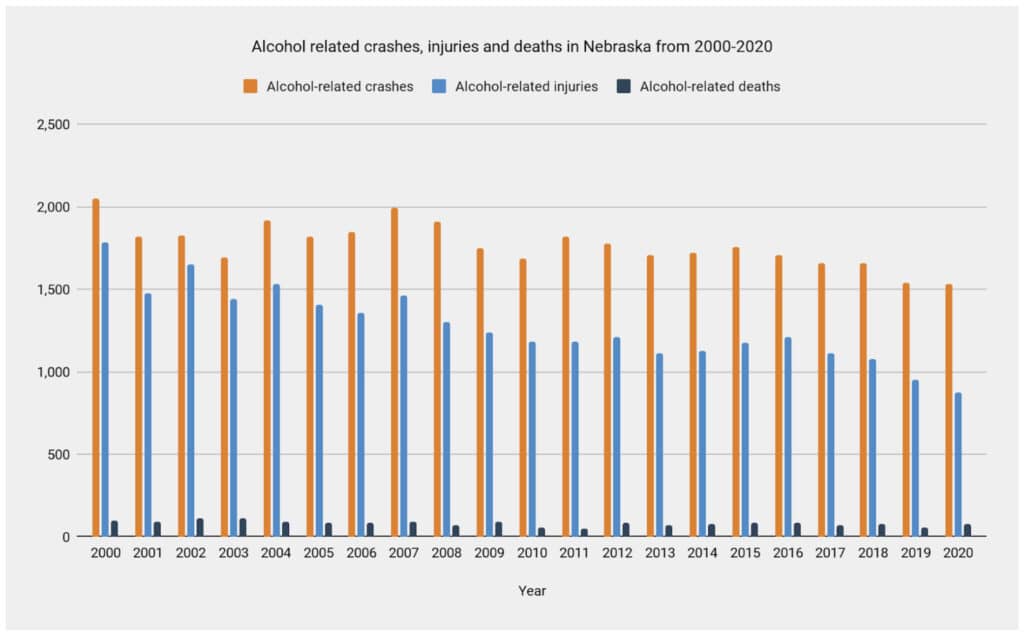
You should know not to drive drunk, but do you know what to do if a drunk driver injures you?
Drinking and driving can kill you or someone else. And if you’re charged with an alcohol-related offense, it can change your life forever. Here’s what you need to know before you drive in Nebraska.
There were 7.9 alcohol-related crashes for every 100 million miles driven in Nebraska in 2020, according to the state’s Department of Transportation.
Reviewing data from 2000 to 2020, there is an average of 36,444 total car crashes per year in the state; of those, an average of 1,772 (4.8%) are alcohol-related. However, when it comes to fatal crashes, the numbers look a little different. About 34% of fatal crashes are alcohol-related, meaning you’re more likely to be involved in a crash where someone dies if either of the drivers has been drinking alcohol.
Here are some Nebraska drunk driving statistics:

The numbers are important for the sake of perspective about just how many Nebraska lives drunk driving affects each year, but this doesn’t tell the whole story. The families and friends of each person injured or killed by a drunk driver are impacted, too. That’s why Nebraska drunk driving laws are important to them—the law can’t bring back a lost loved one, but it can provide a way to receive compensation for financial losses.
If you’re the victim of a Nebraska drunk driver:
It’s important to know that there’s a difference between a driver’s criminal proceeding for a DUI and your civil personal injury lawsuit.
Only the District Attorney or a comparable government agency can charge a person with a crime, like DUI. They might be charged with a DUI-related offense (or not), but this is separate from your pursuing civil damages. A conviction on a DUI offense (or any crime) does not provide you—the victim—with financial compensation. The only satisfaction for you might be that justice was served.
If you suffered personal injury or property damage because of a drunk driver, you can make a claim for your costs related to the accident against the driver’s insurance policy. If the driver is uninsured or the policy does not cover the full extent of your injuries, then you can file a civil personal injury lawsuit. It’s a separate proceeding from the defendant’s criminal case, but evidence of a conviction for DUI can help to prove their liability for your injuries.
Nebraska DUI laws
Defining DUI & BAC
Driving under the influence (DUI) means your ability to safely drive a vehicle is impaired to “an appreciable degree.” It’s defined as operating a motor vehicle or being in actual, physical control of the vehicle if you are:
- Under the influence of alcohol or drugs, or
- If your blood alcohol content (BAC) is .08% or higher.
Nebraska law allows for a driver’s breath or blood to be tested for alcohol. Likewise, a charge can be for either drugs or alcohol. Some police officers have special training to spot impairment from certain drugs. You can also be charged with DUI if you’ve used enough marijuana to be impaired.
A .08% BAC is considered “per se”, which means there is no other evidence required to support a DUI conviction.
You can also be charged with DUI if you’re simply sleeping in your car because you’re in actual physical control of the vehicle. Being asleep behind the wheel meets this criterion.
Nebraska DUI penalties
| Offense | Sentence | Probation | License revocation |
|---|---|---|---|
| 1st offense DUI | Seven to 60 days jail time & $500 fine | $500 fine, community service could substitute for minimum jail time | Six months |
| 1st offense, aggravated | Seven to 60 days jail time & $500 fine | $500 fine & two days in jail or 240 hours of community service | One year |
| 2nd offense DUI | 30-180 days jail time & $500 fine | $500 fine & 10 days in jail or 240 hours of community service | 18 months |
| 2nd offense, aggravated | 90 days to one year jail time & up to $1,000 fine | $1,000 fine & 30 days jail time | 18 months to 15 years |
| 3rd offense DUI | 90 days to one year jail time & up to $1,000 fine | $1,000 fine & 30 days jail time | 15 years |
| 3rd offense, aggravated | Felony IIIA, 180 days to three years jail time, up to $10,000 fine | $2,000 fine & 90 days jail time, 90 days continuous alcohol monitoring (CAM) | 15 years |
| 4th offense DUI | Felony IIIA, 180 days to three years jail time, up to $10,000 fine | $2,000 fine & 90 days jail time, 90 days CAM | 15 years |
| 4th offense, aggravated | Felony IIA, up to 20 years jail time, up to $25,000 fine | $2,000 fine & 120 days jail time, 120 days CAM | 15 years |
| 5th offense DUI | Felony IIA, up to 20 years jail time, up to $25,000 fine | $2,000 fine & 180 days jail time, 180 days CAM | 15 years |
| 5th offense, aggravated | Felony II, two to 50 years in prison | $2,000 fine and 180 days jail time, 180 days CAM | 15 years |
What is an “aggravated” offense?
These sentences and penalties are not cut and dried.
Aside from BAC alone, there are other factors that contribute to a DUI sentence. For instance, a high BAC (.15% or higher) is an aggravating factor. Others include:
- Previous DUI convictions
- Causing serious bodily injury or death to another person
- Being under the legal drinking age
- If your license was already suspended or revoked at the time of the DUI offense
Nebraska BAC law for commercial drivers
A commercial driver can be convicted of DUI with .04% BAC. If you’re hauling hazardous materials at the time of the DUI, your commercial driver’s license (CDL) will be revoked for three years. A second offense would result in a permanent CDL revocation. If you have any measurable alcohol, even if it’s less than .04%, you receive an “out of service” notice and are not permitted to drive for 24 hours.
Nebraska implied consent law
When you operate any motor vehicle in Nebraska, you automatically consent to chemical testing for alcohol, drugs, or other controlled substances. If you refuse testing, your license could be suspended.
Nebraska zero tolerance law
A driver under the legal drinking age of 21 must have a BAC of .02% or lower.
If you’re the victim of a drunk driver and you believe you’re entitled to compensation, you can contact a Nebraska personal injury lawyer to find out your options for financial recovery.
See our guide Choosing a personal injury attorney.

